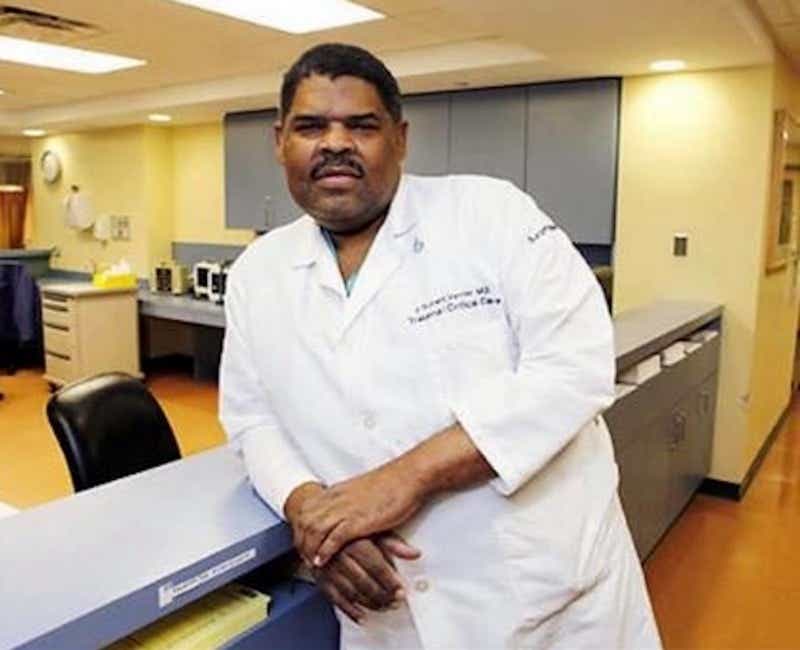Dr. J. Ronald Verrier worked at St. Barnabas Hospital for two decades. His sister and niece tell his story.
Today, our Wake-Up Call newsletter is telling the story of Dr. J. Ronald Verrier, a devoted husband, father, and surgeon, who died at 59 after fighting the coronavirus on the front lines in New York City.
At St. Barnabas Hospital in the Bronx, hospital staff had a nickname for surgeon Dr. J. Ronald Verrier: “the gentle giant.” He served as a surgeon at the hospital for two decades — most recently overseeing the hospital’s ICU.
Verrier’s younger sister, Pascal, told us. “One of the doctors at the hospital said, ‘If you had a bad day and saw him, he’d make things better, because he’d have something positive to tell you.’”
Born and raised in Haiti, Verrier watched his doctor father — and followed in his footsteps. He attended medical school at Faculte de Medicine et de Pharmacie in Port-au-Prince, before emigrating to the U.S. in the 1990s, where he completed his residency at Lincoln Medical Center in the Bronx.
In New York, Verrier lived with his wife and three children, in Woodmere, Long Island, whom he loved dearly, and had a large presence at big family gatherings.
“He was passionate about everything,” Pascal told us. “He loved sports and politics. And he had a passion for music — specifically Haitian music. Haiti always held a special place in his heart.” When the country experienced a massive earthquake in 2010, he flew there the next day — to help.
As a doctor, Verrier also had a knack for mentorship, overseeing St. Barnabas’ surgery residency program and mentoring family members — like his niece Dr. Christina Pardo, an NYC obstetrician and gynecologist, now dealing with Covid-19 on the front lines. “I am a physician largely because of him,” she told us. “Once I decided on that path…he was my mentor until now — for every step.”
When the Covid-19 outbreak hit NYC, Verrier told his family that he wasn’t worried about himself — despite his history of heart problems. Dr. Pardo said: “He loved what he did, and there is absolutely nothing that would have kept him from doing that. In fact, knowing him, he was probably doing more.”
Coronavirus hit St. Barnabas hard. Verrier described the Emergency Room to Pascal as a “war zone,” that kept filling up with more and more patients.
“He said it was heart wrenching,” Pascal said. “The hardest thing for him was the fact that patients couldn’t see the families, and he made sure that he went to visit them everyday… just to reassure them.”
“Some patients would flourish and some patients — it didn’t matter what you tried — they would not make it,” she added.
Data shows that Covid-19 is disproportionately hitting black communities. The Bronx, a majority African American and Hispanic borough, has the highest per-case fatality rate in New York City.
“There’s a lot of poverty in the Bronx. And usually, wherever there’s poverty, the health systems are also under-resourced,” Dr. Pardo said. “This is a reflection of the inequality and inequity in our system.”
“The people who work in the community have higher exposure, not just because they’re seeing more numbers, but because their hospitals aren’t as resourced as others,” she added. “And that is shameful.”
Despite reported shortages at St. Barnabas, Verrier assured his family he did have proper protective gear and washed his hands constantly.
But Verrier himself began experiencing Covid-19 symptoms around March 28th. Shortly after back pain and a fever began, he tested positive, but continued working from home. His symptoms came and went. He gradually developed a cough and lost his sense of taste and smell.
“He thought he was going to beat it — until the last minute,” Pascal said. Around April 7th, Verrier began experiencing “shortness of breath,” and was rushed to a hospital near his home on Long Island.
Pascal said that he didn’t want to try any of the treatments, including the much-touted malaria medicine, “because there were too many patients that needed them.” He insisted he would be fine. But he took a turn for the worst: Verrier passed away on April 8th, 2020 at the age of 59.
When Pascal heard the news, she said “it was like the world had collapsed.” “The first thought was just like, ‘It just can’t be possible,’” Dr. Pardo added. “He was larger than life in every aspect.”
To honor his legacy, his family plans to start a foundation in his name — to help aspiring medical students get their start in the world. “As large as he was, his heart was bigger,” Pascal said. “It’s a big loss.”
Our hearts are with Pascal, Christina, and their loved ones at this time.
Reporting by staff writer Amanda Svachula
This originally appeared on Medium.com









